Helena P. Schrader's Blog, page 65
July 14, 2012
Creative Writing 101: Importance of Research
Aspiring writers are often told to "write about things they know" and, following this advice, many authors don't think they need to do any research before they sit down to write. While this might be true for a completely autobiographical work, any author interested in writing more than one autobiography will rapidly realize that research is not only necessary but liberating.
After all, for a literate population, knowledge need not be first hand, and good research expands exponentially the topics that we can write about without violating the rule to "write about things you know." The fact is, most of what we “know” we have learned indirectly either formally or informally. We have listened to experts in the classroom, attended lectures and seminars, and taken part in discussions and private conversations. We have read newspapers, magazines, academic journals and books. We’ve seen documentary films and TV programs. If we want to learn about a specific topic and become experts in it, we can. For a novelist, this means that “writing about what you know” need not mean writing about your own experiences, but rather writing about places, periods, professions, and events that you have thoroughly and professionally researched.
The operative phrase here is "thoroughly and professionally researched." Reading one article, watching one TV program or making a quick check of "the facts" on wikipedia does not qualify. If you’re going to write a book about a fireman in New York on September 11, 2001, then you better carefully research everything about the New York Fire Department’s organization, equipment, social structure, and internal culture as well as the exact timing, sequence and impact of each terrorist attack.
Keep in mind that good research does not interfere with a book, but rather enhances it. It provides the background and context for the story; it lends the book authenticity. If a book reads like a device to lecture the reader on the technology or religion or social structures of a different place or time, then the author has failed. But if a book allegedly set in a different place or time is filled with anachronisms and inaccuracies, then the book is just a much a failure and no amount of brilliance in delivery (style) can save it. Great fiction must be both authentic and literary.
The temptation is to write quasi-autobiographical books, but that gets harder with each novel. It can be difficult to handle a wide-range of themes, to develop significantly different plots and populate the book with recognizably different characters, if the setting is always the same.
The more difficult, but more rewarding, route is to do research and learn about different cultures, periods and places. If nothing else, you will be a better educated person, enriched by knowledge of things you could not have imagined so that, even if you write fantasy, you you find your imagination has been stimulated in new ways.
Published on July 14, 2012 08:02
July 1, 2012
Review of "Chasing the Wind / Where Eagles Never Flew"
Shortly after the release of my Battle of Britain Novel, "Chasing the Wind" the following review was published on Amazon. Last year, the book was released in Kindle format under the title: "Where Eagles Never Flew." Any readers interested in WWII, particularly the Battle of Britain, will appreciate Mr. Rodwell's assessment of this book.
The best novel yet about the Battle of Britain!, 30 Aug 2007 By Mr. Simon A. Rodwell (Milton Keynes, UK) - See all my reviews
[image error] This is a superb novel about the Battle of Britain and is a must read for anyone interested in that period in our history. It is now 67 years since the Battle of Britain and the summer of 1940 is gradually moving from common memory into a piece of history. So much has been written about the battle from the early factual accounts written within a year or two of the battle, through to a rash of 1950's pilot biographies and memoirs and a host of novels from the 1960's to the present day, that it is hard to imagine that a new novel could be written that would make the conflict seem fresh. Yet this is exactly what `Chasing the Wind' has achieved.
The novel tracks through all the important stages of the battle from the closing stages of the Battle for France through to the early days of October 1940. The historical accuracy is stunning and the historical characters featured in it are faithful to their biographic details. Fictional character development has real depth (and this is something that is sometimes lacking in wartime fiction about flight). The story is also told from both German and British perspectives as well, with the reader's sympathies drawn to several key characters regardless of on which side of the English Channel they happened to be based. The variety of character roles has also been cleverly constructed since the reader is given so many different imaginary camera angles to view the unfolding battle from, as well as building a full picture of the social atmosphere of the times in both Britain and occupied France. Technical detail is similarly superb. The performance characteristics of all aircraft involved, for example, are faithfully represented.
It is often hard when writing a novel about historical events to avoid the judgement of hindsight. The outcome of the Battle of Britain had a result which history judges as being in Britain's favour. What `Chasing the Wind' manages to do, however, is to convey the uncertainty of the times. The outcome was very uncertain for both sides and the fear very real for all concerned. The novel catches this so brilliantly that at times one forgets it is a novel at all and that it is more a documentary memoir of those living at the time.
Note: Next weekend I will be travelling, and the next post to this blog will be on July 14.
Published on July 01, 2012 03:04
June 24, 2012
Dialogue in Action: Example 1
Last week I discussed writing dialogue in fiction. Here is an example from Chasing the Wind (Kindle Edition: Where Eagles Never Flew.)
The phone rang behind him. The WAAF clerk answered, “606 Squadron.” The WAAF sprang to her feet. “Yes, sir! He’s right here, sir. One moment, sir!” She covered the speaker and “whispered” in a loud voice to Allars, “Squadron Leader Allars, sir. It’s Air Vice Marshal Park, sir! He wants to speak with you, sir!”
Allars stamped over to the phone and took it. “Allars here.”
“Park. I’ve just had word that Squadron Leader Jones has been found dead. Apparently his parachute failed – or was shot up. In any case, it didn’t open.” There was a pause.
Allars felt compelled to say dutifully. “I’m very sorry to hear that sir.” Was he? Not at all. He’d long thought Jones wasn’t up to the mark.
“Doug, I’d like an honest answer from you.”
“Of course, sir,” Allars answered, although he was alerted by the use of his first name that this was a special request.
“Wait ‘till you hear the question, Doug.”
“All right.”
“First, is your remaining Flight Lieutenant up to the task of taking command of the squadron?”
Allars didn’t even have to think about that one. “Under no circumstances. If anyone had asked me, I wouldn’t have made him a flight commander. He’s an irresponsible, self-satisfied whelp, who thinks that just because his father inherited a coal fortune the whole world ought to dance to his tune. I’m not saying he can’t fly, but he certainly can’t command the respect of men—if you want my honest opinion, Keith.”
“I asked for it. All right, then, is the rest of the squadron a write-off or not?”
Allars hadn’t been prepared for that. It was a dangerous question. “There are still ten other pilots, Keith, and as I said, Tommy can fly well enough. Also, I’ve been told we’ll be back up to twelve aircraft by tomorrow.”
“That’s not what I asked, Doug. The question is: should I pull 606 out of the front line?”
“Pull them out? But we’ve only just had a rest. I mean, other squadrons have been in it longer. I think we can cope.”
To Park on the other end of the line, Allars sounded quite stunned by the possibility, as if it had never occurred to him. But he didn’t sound really confident about their capabilities, either. Park was silent for a moment , unsettled, and then became more explicit. “There are other squadrons that are just plain tired and need a rest, but, when I visited 606 on the 16th, I had the feeling the issue was morale more than exhaustion. The problem is this: almost every squadron we’ve rotated in from the north has been slaughtered within two to three days of arrival in 11 Group – often with hardly anything to show for it. The squadrons that have been here longer have much higher kill-to-loss ratios and have consistently lost fewer pilots. If I pull 606 out, the chances are that the replacement squadron will get badly mauled – maybe lose six or seven pilots – before the week is out. Now tell me if you think 606 needs to be pulled out.”
“In that case, definitely not. There is some good material here.”
“You think a new CO could turn them around?” Park asked explicitly.
“The right CO could.”
“I hope your right, Doug.”
“So do I, Keith – if not, I’m going to have several young men’s lives on my conscience, aren’t I?”
“If you don’t already, Doug, you’re a lucky man.”
The phone rang behind him. The WAAF clerk answered, “606 Squadron.” The WAAF sprang to her feet. “Yes, sir! He’s right here, sir. One moment, sir!” She covered the speaker and “whispered” in a loud voice to Allars, “Squadron Leader Allars, sir. It’s Air Vice Marshal Park, sir! He wants to speak with you, sir!”
Allars stamped over to the phone and took it. “Allars here.”
“Park. I’ve just had word that Squadron Leader Jones has been found dead. Apparently his parachute failed – or was shot up. In any case, it didn’t open.” There was a pause.
Allars felt compelled to say dutifully. “I’m very sorry to hear that sir.” Was he? Not at all. He’d long thought Jones wasn’t up to the mark.
“Doug, I’d like an honest answer from you.”
“Of course, sir,” Allars answered, although he was alerted by the use of his first name that this was a special request.
“Wait ‘till you hear the question, Doug.”
“All right.”
“First, is your remaining Flight Lieutenant up to the task of taking command of the squadron?”
Allars didn’t even have to think about that one. “Under no circumstances. If anyone had asked me, I wouldn’t have made him a flight commander. He’s an irresponsible, self-satisfied whelp, who thinks that just because his father inherited a coal fortune the whole world ought to dance to his tune. I’m not saying he can’t fly, but he certainly can’t command the respect of men—if you want my honest opinion, Keith.”
“I asked for it. All right, then, is the rest of the squadron a write-off or not?”
Allars hadn’t been prepared for that. It was a dangerous question. “There are still ten other pilots, Keith, and as I said, Tommy can fly well enough. Also, I’ve been told we’ll be back up to twelve aircraft by tomorrow.”
“That’s not what I asked, Doug. The question is: should I pull 606 out of the front line?”
“Pull them out? But we’ve only just had a rest. I mean, other squadrons have been in it longer. I think we can cope.”
To Park on the other end of the line, Allars sounded quite stunned by the possibility, as if it had never occurred to him. But he didn’t sound really confident about their capabilities, either. Park was silent for a moment , unsettled, and then became more explicit. “There are other squadrons that are just plain tired and need a rest, but, when I visited 606 on the 16th, I had the feeling the issue was morale more than exhaustion. The problem is this: almost every squadron we’ve rotated in from the north has been slaughtered within two to three days of arrival in 11 Group – often with hardly anything to show for it. The squadrons that have been here longer have much higher kill-to-loss ratios and have consistently lost fewer pilots. If I pull 606 out, the chances are that the replacement squadron will get badly mauled – maybe lose six or seven pilots – before the week is out. Now tell me if you think 606 needs to be pulled out.”
“In that case, definitely not. There is some good material here.”
“You think a new CO could turn them around?” Park asked explicitly.
“The right CO could.”
“I hope your right, Doug.”
“So do I, Keith – if not, I’m going to have several young men’s lives on my conscience, aren’t I?”
“If you don’t already, Doug, you’re a lucky man.”
Published on June 24, 2012 08:20
June 17, 2012
Creative Writing 101 - Dialogue
Dialogue ought to be written by your characters. If you’ve got good characters, they will say what they think and all you really need to do is listen to them and transcribe what they say. Once you’ve got the basic dialogue down, you can polish it up a bit, adding descriptions sparingly and only as necessary to avoid possible confusion.
But keep in mind that a conversation can easily turn in directions you don’t want it to go and in doing so it can take a novel off course. This is where characters are rather like actors. They respond to the other person spontaneously and in character, but there’s nothing wrong with calling “Stop! We’re getting off topic here. Go back. Take it again from ….”
Nor is there anything wrong with knowing what the outcome of a dialogue ought to be. It’s legitimate to start a conversation with the knowledge “this is where x and y clash so violently that they say things they will later regret.” Or “this is where x learns about y’s vulnerabilities.” If you have developed good characters, you will only need put this out there and they will give you the actual lines – absolutely in character.
Characters talking with one another is, furthermore, far more effective that any narrator talking about what characters think or feel. Letting the characters speak for themselves is much more entertaining, authentic and exciting. After all, dialogue alone make a play, and theater is an older, arguably more effective, art form than novels.
Published on June 17, 2012 02:34
June 9, 2012
Excerpt from "The English Templar" II
Geoffrey mounted the first two steps of the papal throne and waited. He was separated from the pope by no more than a yard. He could see that the pope wore white powder on his face and a touch of rouge. He smelled of sweet bath water. Geoffrey remembered that this was a man who openly kept a mistress – a noblewoman thirty years younger than himself.
“Monsieur de Preuthune,” the pope opened slowly, “you are a courageous man. You fought against the Saracen for your faith—“
“As did the Knights Templar for nearly two hundred years!” Geoffrey’s fervor, the unexpected hope that he might be able to influence the pope to intervene on behalf of his brothers, made him forget himself.
The pope scowled and lifted his hand in startled reproach. He had not expected the same impudence from this nobleman he had had to suffer from the king and his ministers. Geoffrey bit his tongue. “As we were saying,” the pope continued, “you fought against the Saracen for the sake of your faith, and we know that the Saracens outnumbered the army of Saint Louis many, many times.” Geoffrey nodded, and the pope continued, “But you do not seem to understand the nature of the enemy here.” He paused and looked sharply at Geoffrey.
“I was trained in the Temple, Your Holiness. We were trained never to retreat unless the enemy outnumbered us more than three to one. It was the Templars who were the vanguard of the Seventh Crusade. We attacked at Damietta, we attacked all along the advance, and – although King Louis had ordered restraint – we attacked at Monsourah. Do you think I should fear now?”
“Yes,” Came the blunt reply. “We see you are a man of simple, straightforward faith. As a man of the sword, you are not used to intrigue and the need for discretion. But you are a subject of the King of France, and if you do not wish to die a criminal, then you would do well to forget your Templar past.” The pope leaned back in his throne and let this sink in.Geoffrey could not tell if he were being warned or threatened.
The pope leaned forward again and now he whispered, “We too are the king’s prisoner. The king would not hesitate to charge us with the same crimes he has leveled against our predecessor, Pope Boniface VIII. We are powerless against him. Neither excommunication nor any other spiritual sanction impresses him. Do you think we have not tried? Haven’t you noticed how the city swarms with his soldiers?” he demanded.
Geoffrey saw fear in the pope’s eyes and the trembling of his thin hands. This self-indulgent, frightened old man was supposed to be Christ’s vicar? Geoffrey’s disbelief gave way to contempt. This old man cared more for his own survival – his survival, his comfort and the trappings of power than for the duties of his sacred office. He was not willing to fight for the substance of his authority. He was prepared to live a sham.
Ah, I should have known, Geoffrey cursed himself. A pope who keeps a mistress could have no interest in moral authority. He is content as long as his creature comforts are provided and people pretend to respect him.
Geoffrey chose his next words with deliberation. He spoke softly and distinctly, his eyes fixed on the watery, pale eyes of the pontiff. “If you had not allowed the king to arrest all the Knights Templar in the kingdom, you could have called upon an army.”
The pope started. His pointed nose was running and a drop of water hung on the tip between the nostrils. “What—“
“The Templars owed their allegiance to no king, only to you. You could have surrounded yourself with the best knights in Christendom – and then you could have challenged Philip – or any king – to any test of strength you liked. They would have died for you, Your Holiness, with the same elan and devotion with which they died for Jerusalem and Acre. You could have made kings dance to your tune and set them aside – instead of letting them treat you like a pawn.”
The pope had gone pale as he stared at Geoffrey. Hastily, he brushed the drop from his nose with the back of his gloved hand and looked away. He swallowed; Geoffrey could see the Adam’s apple bobbing in his scrawny throat. “With your permission,” Geoffrey said coldly and he backed off the dias.
“Wait!” The pope cried and Geoffrey waited, but it was too late. They both knew it was too late.
Published on June 09, 2012 07:46
June 1, 2012
Reviews of "The English Templar"
Historically intriguing with well developed characters., 26 May 2000 By A CustomerThis review is from: The English Templar (Templar Trilogy) (Paperback) From the very first pages I was intrigued by the wonderful character development by Schrader and the rich historical details that enriched the descriptions of the protagonists as well as their surroundings. It was easy to emotionally connect with Felice and Sir Percy, the two protagonists, through both their admirable traits and their faults. The end came too quickly, I await more from Schrader. A wonderful read, interesting and entertaining. Help other customers find the most helpful reviews
Exciting, though-provoking, historically accurate and moving, 3 Sep 1999 By A CustomerThis review is from: The English Templar (Templar Trilogy) (Paperback) This is a profound, thought-provoking and at times disturbing book - but a great read nevertheless! It has just about everything a demanding reader wants in a good novel: excitement but also wisdom, a love story that transcends mere conventional lust and romance, historical accuracy, psychological insight and just plain good prose. For me personally, as someone who has personally known torture victims of Nazi Germany, the author's understanding of the psychological after-effects of torture impressed me particularly. Anyone who enjoys learning the easy way - through good fiction - should read this book.
Published on June 01, 2012 11:42
May 24, 2012
Creative Writing 101: Characters
Nothing is more important to a novel than good characters. The theme may be visionary, the descriptions exquisite and the plot breath-taking, but without good characters it “ain’t good fiction.” Period.
Nor can we, writers, really create characters – not good ones. We can create stick figures that stiffly toddle across the pages of our book, or we can cut-and-paste from other works, or even use pre-fab microsoft-like creations that everyone instantly recognizes: the beautiful seductress, the clever detective, the sensitive misunderstood child, the evil step-mother etc. etc.
Good characters are as complex as human beings, and only God can create humans. Writers are not God. We are at best disciples and prophets, interpreting God’s word, describing his creations – inadequately. But the better we are at understanding humans, the better we will be at describing them. And the better we describe them as unique individuals, the better will be our novel.
And just as humans grow-up, make mistakes, learn from their mistakes (or fail to do so), good characters are neither perfect nor stagnant. Good characters have flaws, and good characters change in the course of a novel. Only ancillary characters should be essentially the same at the end of a novel as they were at the beginning. While this is most pronounced in novels spanning a longer period of time (like my biographical novels), it should be true even of a novel covering only a few months – because those few months must represent a significant event for the central characters or the novel has no credible plot.
My Battle of Britain novel, for example, only covers the months of May to September 1940, but for the characters it a pivotal period. Another novel could describe no more than the day September 11, 2001 – but it would only be a good novel about that day, if the key characters are different in a significant way at the end of it.
And good characters – really good characters – will never leave you, the writer, in complete control of the plot. They will take the bit in their teeth now and again, and run away with you. When your characters do that, when they start shaping the novel for you, you know you have a good cast of characters. From then on, your job becomes one of directing and coaching rather than dictating. It is always a wonderful moment!
Published on May 24, 2012 12:48
At last the real Sparta emerges!
Under the above title, Peter Spencer published the following review of "Leonidas of Sparta: A Boy of the Agoge." Helena Schrader has finally revealed Sparta and Spartan society as it most probably would have been. This is not the Sparta of many modern European writers, but Helena shows a society where literacy was an essential tool of all citizens (Spartan soldiers also travelled regularly as envoys and on diplomatic missions - makes it a bit hard if you are an ignorant illiterate doesn't it? Also Spartan women managed property - I wonder how they did the books and kept the good management they were famous for?), and the Agoge was more in line with a boarding school education now. Indeed even now, many Army officers I know went from an elite GPS boarding school to Royal Military College Duntroon, and then to their Regiments in a very similar progression to Spartan youth.
Now a retired Australian Army Officer, my military special study was Sparta, and it constantly annoyed me that many writers espoused a society that could not have produced either the successful and prosperous culture, or the military supremacy that Sparta had for hundreds of years. It should be remembered that for Spartan citizens, this was a genuine democracy, who the rest of Greece looked to for defence from tyrannical governments. Even Athens had sought their help here. Helena explores what the real Sparta probably was, through the eyes of a fairly modest kid, who proves to be very real and very 'normal' but who will become the only Spartan King to ever undergo the Agoge. Helena's portrayal of Leonidas as a developing personality fits perfectly with the man who will become one of the iconic 'heroes' of history.
Thank you Helena for the real Sparta, and the real Leonidas.
I can barely wait to begin book 2.
Thank you, Peter! I hope you have enjoyed "A Peerless Peer." Meanwhile, the final book in the trilogy has gone to the publisher. We're still on track to release it in September of this year.
Published on May 24, 2012 12:32
May 11, 2012
Excerpt from The English Templar I
Percy felt ill. He knew he could not face the Inquisition again. He would kill himself first. He should kill himself at once, he realized, somewhat shocked that it had taken him so long to think of it. That was the only way to save Sir Geoffrey and the girl from arrest and possibly torture.
“I need a dagger,” he told Geoffrey softly.
Geoffrey went stock-still. “What for?”
“Don’t worry. I know how to use it.”
“To do what?” Geoffrey insisted sharply.
“To kill painlessly.”
“To commit suicide?” Geoffrey grasped Percy’s bony shoulders in his long, skeletal hands and shook him with a force neither of them had expected. “After all we’ve risked to keep you from dying, you would dare to throw your life away?”
Percy closed his eyes and didn’t answer. They didn’t know him and so could not possibly know whether he was worth saving. He wasn’t even sure himself – rationally – that he was worth saving. There was an inborn instinct that clung to life, but when he used his intelligence he saw only that he was a younger son, trained to arms and vowed to an institution which had been utterly annihilated. Never in his life had he done anything of sufficient value to warrant the sacrifice of others for his sake. He had not even, in the end, been strong enough to stop himself from adding his voice to the thousands who condemned the Order and thereby betrayed his brothers to further pain and endless humiliation. He had contributed to the ruin of the only thing that gave him status and purpose. Why should he go on living?
“Listen to me!” Geoffrey still grasped him in his claw-like hands, the knuckles white from the effort. “I am an old man who has lived much too long already. If I choose to die for your sake, that is my decision!”
Percy opened his eyes and looked straight at Geoffrey. “And the Lady Felice?” he whispered.
Geoffrey looked over his shoulder at his granddaughter. At sixteen, she still had soft, unfinished features and the half-mature body of a teenager, but the look on her face was not adolescent.
Felice answered for herself. “I am neither a child nor a fool. I knew what I was doing when I sent for my grandfather. To have left you there would have been to deny Christ himself. If the Pope, the King and all the clergy of France are too blind to see that, then God have pity on their souls! I knew the risks.”
Percy shook his head. No one who had not faced the Inquisition could really imagine what it was like. But she had reminded him of something: it was as morally contemptible for them to deny him help as it was for him to expect it under the circumstances. Checkmate.
Published on May 11, 2012 13:02
May 5, 2012
Sparta (Sparti) in Spring
Returning from Kythera, my husband and I spent a night in Sparta (“Sparti,” as the modern town is designated on most maps and signs nowadays, is Ionian; I prefer to use Doric, which shows up now and again on local signs). The modern city, full of students, traffic clogging the main street and disco music filling the night air, is not always the best place to evoke ancient Sparta, but it has charm of its own. The palms of the main avenue remind one of the more trendy cities on the Riviera, but the backdrop of snowy Taygetos is more beautiful. There are good restaurants, good hotels, a pretty square with a monument to the Three Hundred, and a charming little museum with some excellent pieces of Lacedaemonian sculpture. The ancient acropolis is far enough away from the heart of the modern town to allow a stroll in contemplative silence, and I am always pleased to see the Leonidas standing guard in front of the soccer stadium. In short, I always enjoy a stop in Sparta on our way to or from Kythera.
Particularly interesting this trip was that the Eurotas was running black. Usually, when I have been in Sparta, it has been muddy and lazy. This trip is was running fast and deep. This suggests that in ancient Sparta as well the river ran deep and fast at least some of the time. Indeed, I’ve heard theories that the climate of Greece was generally cooler and wetter in the archaic and classical periods. Certainly, the population density was lower and so the consumption of water less. Less water consumption nearer the source of the Eurotas would have meant greater volumes of water flushing down through Sparta. Certainly, it looked more inviting this time around, and I could easily imagine the boys of the agoge cavorting around in it and young citizens plunging in to refresh themselves after drill.
Since pictures are worth a thousand words, however, I think I’ll stop writing here and just upload some of the pictures I took this year. I end with a picture of me at Leonidas feet.
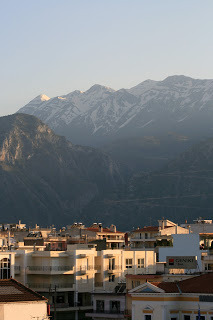
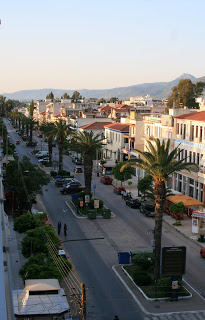
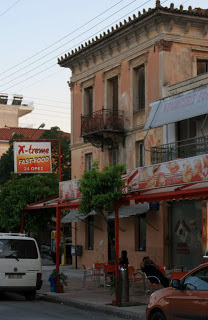

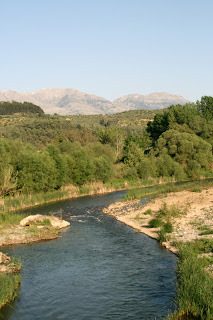
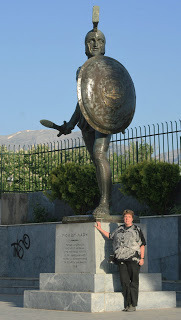
If you look hard you can read the “Μολαν Λαβε” on the base of the statue.
In other news, I submitted the manuscript for the third book of the Leonidas Trilogy, Leonidas of Sparta: A Heroic King to the publisher today. If all goes well, the book will be released on schedule in early September.
Published on May 05, 2012 07:03



